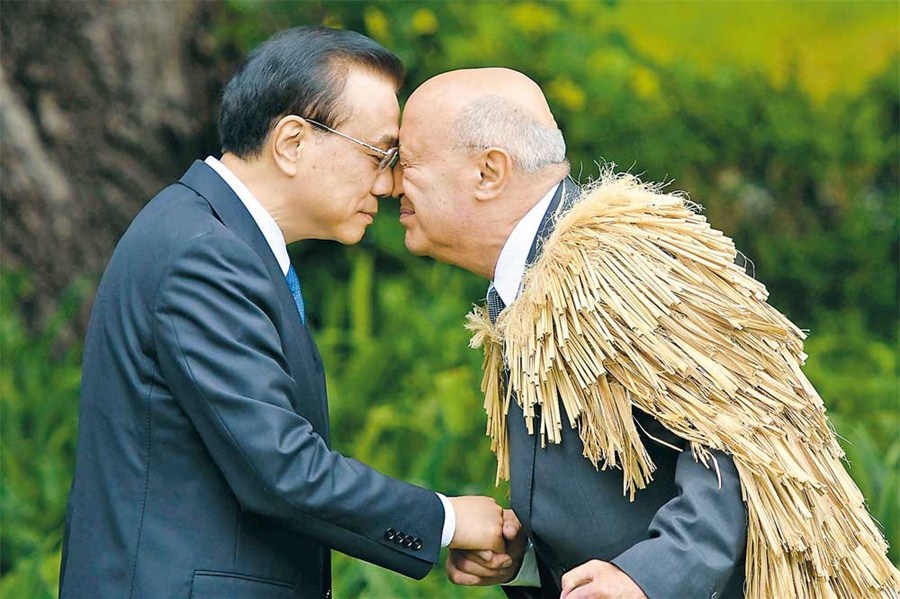China, New Zealand free-trade boost
Chinese Premier Li Keqiang and Maori scholar Piri Sciascia press noses and foreheads together in a hongi, a traditional Maori welcome, during an official ceremony at Government House in Wellington yesterday. Li is on a four-day visit to New Zealand. — AFP
CHINA and New Zealand ramped up their cooperation yesterday, saying they would open talks soon to expand a successful free-trade deal in place for nearly a decade.
The announcement came during a visit by Chinese Premier Li Keqiang.
China is New Zealand’s second biggest trade partner, after Australia, which Li visited last week.
New Zealand Prime Minister Bill English said the 9-year-old free-trade deal had been a huge success and resulted in a tripling of trade between the countries. He said an upgrade to the agreement would expand trade further, and that talks would begin on April 25.
Li also praised the deal, saying it was the first that China had signed with a developed nation and remained the most advanced. He said the deal helped send a signal to the world.
“It’s important to the peace and stability of the region and beyond,” he said.
New Zealand hopes a renegotiated agreement would allow it to sell more dairy products to China, while China hopes to sell more goods in New Zealand and erase a small trade deficit.
The original deal imposes tariffs on certain New Zealand products sold in China after limits are reached. “One of the issues from New Zealand’s point of view is that the growth in trade has been so strong that some of the safeguard levels set back in 2008 are quite low levels, and the dairy industry has raised this issue with us,” English said.
New Zealand was also the first Western country to join the China-initiated Asian Infrastructure Investment Bank after which it helped usher in the United Kingdom and Australia.
Several other agreements were announced, including one that allows chilled New Zealand meat to be exported to China in a six-month trial. China already accepts frozen lamb and beef.
“This agreement has the potential to be worth hundreds of millions of dollars for our farmers, exporters and the wider economy,” said New Zealand Trade Minister Todd McClay.
Other agreements included an increase in the maximum number of direct flights allowed between the countries, a joint climate action plan, and strengthened cooperation on China’s “One Belt, One Road” program.
English said Paul Goldsmith, New Zealand’s regulatory reform and innovation minister, would attend a “One Belt, One Road” summit in Beijing in May.
In a column published in yesterday’s New Zealand Herald, headlined “To New Zealand, with love,” Li wrote that rising international instability and uncertainty “have made it all the more important for China and New Zealand to work together to turn challenges into opportunities.”
New Zealand depends heavily on exports, and Li’s remarks echoed those by English and New Zealand central bank governor Graeme Wheeler, who have warned that possible disruption to global trade is the biggest threat to prosperity.
Li took issue with a local journalist’s question on whether allegations of steel dumping could impact the trade relationship, a spat that English and his predecessor John Key have tried to play down.
Li said China is reducing steel production and exports only a modest amount to New Zealand. He added that while half of China’s dairy imports come from New Zealand, Beijing has not accused New Zealand of dumping them.
Earlier yesterday, English and his wife Mary held a welcoming ceremony for Li and his wife Cheng Hong at the Government House in Wellington.
Li arrived in Wellington on Sunday for a four-day visit to the Oceanian country, the first by a Chinese premier in 11 years.
Source:.shanghaidaily.com


